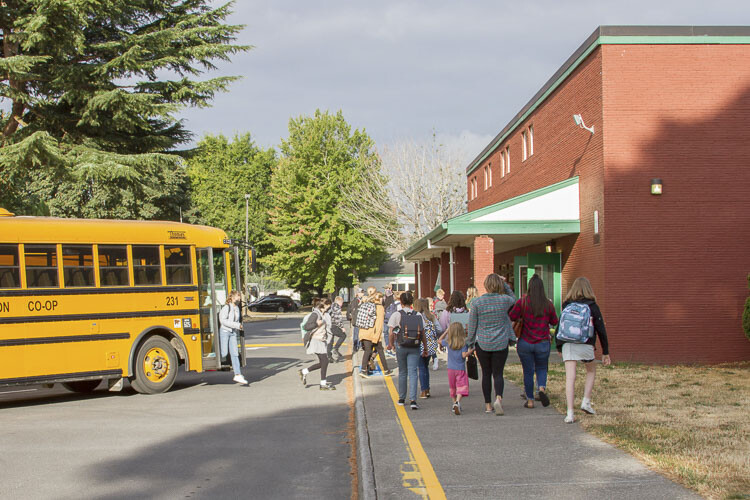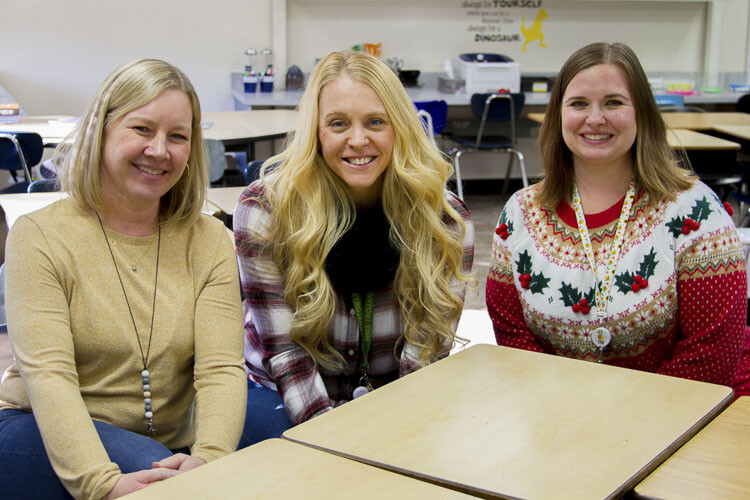
The idea for bringing DSP students into ELA classes stemmed from relationships sixth graders had formed with their DSP counterparts last year
Woodland Middle School’s English Language Arts (ELA) teachers teamed up with teachers in the Diverse Support Plan (DSP) who serve students with disabilities to create an innovative approach to reading comprehension where both groups of students teach and learn from one another.
The idea for bringing DSP students into ELA classes stemmed from relationships sixth graders had formed with their DSP counterparts last year. “Our DSP program had several students who got to know our current sixth graders when they were in the fifth grade,” explained Tara Campbell, a sixth grade ELA teacher. “We wanted to figure out a way to include our DSP students this year and came up with the concept of partner-reading or ‘buddy’ reading, where students take turns reading and guiding each other.”
Four days a week, DSP students join the ELA classes for a block of time. Students partner up, one ELA student with one DSP student, and each takes turns reading. ELA students help guide their DSP partners through sentence structure that might cause them to struggle, help to pronounce difficult words, and assist in teaching them so both groups become more fluent in reading comprehension.
The two teams of teachers decided to start the partnership with reading comprehension due to the importance of reading, and have already seen significant improvements in the performance of both groups of students even though the program has only been in effect for a few months.
“We think ELA makes this partnership particularly effective since reading is a necessary element to every part of our lives every day,” said Jenna Bozarth, a DSP teacher at Woodland Middle School. “We’ve seen significant improvements for our DSP students. For example: one, in particular, started the year as a slow reader, and became much faster since he enjoys competing with his ELA teammates; the competition motivates him to try harder to keep up and improve.”

In addition to helping DSP students learn more effectively, studies show that teaching others helps internalize lessons for the ELA students, as well. “We’re differentiating our typical sixth grade ELA learning experience by including our DSP students to help build inclusivity and diversity as well as improving learning for both groups,” said Kelly Hathaway, a sixth grade ELA teacher. “Additionally, these two groups of students form connections that extend beyond the classroom, so our DSP kids create friendships with our ELA students that they can enjoy throughout school.”
Since students enrolled in DSP programs may have a variety of disabilities, the team found solutions for students who remain nonverbal. “These nonverbal students need to practice their reading skills and develop their reading comprehension just as much as verbal students,” explained Bozarth. “By listening to their ELA counterparts read, our DSP students have the opportunity to hear what developing reading fluency sounds like, which, in turn, improves their own reading development.”
Initially, the teachers thought they might have to pair ELA students who were already more fluent with DSP students in order to ensure both groups would learn more effectively, however, as the program continued, they have discovered this not to be the case. “We’ve evolved the program to pair ELA students who aren’t even reading at their own grade level with DSP students, and the cooperative teamwork has been inspiring as both students improve,” said Campbell. “When the ELA students teach their DSP counterparts, they’re much more intentional as they take on the role as the educator; the patience we see develop as our students work together has been incredibly touching.”
Learn more about how Woodland Public Schools educates our students and serves the community by visiting the dedicated news webpage at www.woodlandschools.org/news/wsd
Information provided by Woodland School District.
Also read:
- Verizon-Cellular Plus giving away free backpacksVerizon-Cellular Plus in Clark County will be giving away free backpacks filled with school supplies on Saturday (July 27) from 10 a.m. to noon.
- Washougal High School earns 2024 Jostens Gold Tier School of Distinction AwardLast week, Washougal High School (WHS) student leaders were recognized with the 2024 Jostens Gold Tier School of Distinction Award for their work to improve school climate and culture.
- Journey Theater getting ready to present ‘The Music Man’Local theater group will have five performances at The Garver Theater in Camas, with opening night set for Aug. 2 Harold Hill had a plan, a plan to con a bunch of folks in the Midwest. But will love get in the way of that plan? By turns wicked, funny, warm, romantic and touching, The …
- Annual Write From the Start School Supply Drive scheduledFor the 9th Year in a Row, Dick Hannah Dealerships Partner with the Foundation for Vancouver Public Schools on their annual Write From the Start School Supply Drive.
- SW Washington’s Lemonade Day Youth Entrepreneur of the Year named by Greater Vancouver ChamberTatum Talbert, a 10-year-old from Camas, who owns Tatum and Her Gnomies, was named the 2024 Southwest Washington Lemonade Day Youth Entrepreneur of the Year by the Greater Vancouver Chamber.









